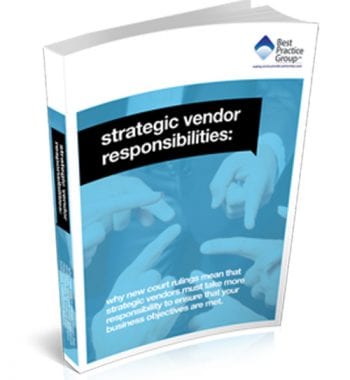 As strategic and trusted supplier partners, the ‘big four’ – PwC, Deloitte, KPMG and EY – take on a significant percentage of the audit work the market has to offer. Reportedly around 97% of all FTSE 350 companies have audit work conducted by them.
As strategic and trusted supplier partners, the ‘big four’ – PwC, Deloitte, KPMG and EY – take on a significant percentage of the audit work the market has to offer. Reportedly around 97% of all FTSE 350 companies have audit work conducted by them.
Due to the sheer volume of projects undertaken and the number of staff required to handle them, every so often it is reported that someone makes a mistake. While mistakes are an inevitability, allowing those mistakes to be repeated or to go unnoticed is less forgivable.
Reports that all four of these organisations have been under the spotlight over the years has been hard to avoid. One of these supplier partners, EY, had not had any non-compliances reported in the mainstream media; that is until the Wirecard debacle, and it is the scale of this fraud that has threatened to dent EY’s reputation.
Auditing 101
After a decade as a FinTech company, Wirecard’s auditors, EY, are now having to face accusations that the billion plus euros the company (Wirecard) had claimed – for the last 3-years – was sitting in an overseas bank account… did not exist.
It is standard auditing practice to validate cash deposits, and had EY completed this task, it is believed that this would have brought to light what has subsequently been described as Germany’s largest post-war business fraud. EY is now facing a number of questions in respect of the efficacy of the audits it undertook.
EY has reportedly said that the financial practices at Wirecard had been designed to not just deceive investors, but also EY as the company’s auditors.
What was Wirecard?
Wirecard was a payment processing company; a middleman organisation between retailers and the banking sector. When you buy something using your credit card, your bank would pay Wirecard and Wirecard would pay the retailer for your purchase.
Wirecard had offices in Germany, Dublin and Dubai, but they were expanding fast so they used a number of third-party companies (reportedly in Dubai, the Philippines and Singapore) to process payments as well. These companies would pay Wirecard a commission, and this commission was accumulating in escrow accounts in the Philippines. By the end of 2019, allegedly, Wirecard had convinced EY that it had 1.9 billion euros in these accounts.
The FT reported that EY stated “We’ve established that third parties, with a deliberate aim to deceive, provided EY with false documentation in connection with its 2019 Wirecard audit. The extent and sophistication of these suggest a large-scale international fraud at Wirecard” and “There are indications that this was an elaborate and sophisticated fraud with the deliberate aim of deceiving our audit team in Germany.”
Though certainly the most significant, Wirecard is not the only audit challenge that EY is having to deal with right now. Two other clients of the company are reportedly having their audits scrutinised in ongoing investigations.
Due to the number of issues that have arisen in auditing work, across the ‘Big 4’ and beyond in recent years, questions are beginning to be asked about whether enough importance and value is being employed on these audit projects by all sides.
Reports into the sector
Two reports into the financial reporting sector were commissioned. One from Sir John Kingsman, assessing the sector’s regulator, the Financial Reporting Council (FRC), suggested that they should be given more powers. The other, from Sir Donald Brydon, looking at the sector as a whole. It suggested that auditing should be looked at as a separate discipline and across the board practitioners should up their level of assumed suspicion at the outset of every audit project. This was to assure greater opportunities to identify fraud where it exists.
Considerations when appointing a good assurance/audit partner
A strategic supplier’s responsibilities extend far beyond what is in your written agreement with them. Numerous implied responsibilities and obligations stem from the law’s assumption of knowledge disparity between a client and their ‘expert’ supplier.
As an ‘expert’ supplier is one that has expressed to you that they have prior experience in similar areas of work to that which you are looking for them to take on, the likelihood is that any supplier you choose to work with could be considered an ‘expert’ under the law.
Starting at the pre-contract exploratory stages and extending throughout your relationship, your expert supplier therefore has a:
‘Duty to warn’
An expert supplier must think beyond the questions it is asked by you to identify any issues that may materially impact on the service provision they may be being asked to provide. This simply looks at the outcomes that you have clearly quantified and agreed with them. If an expert supplier agrees to achieve them, then they have an obligation, in law, to do so. At the same time they are required to identify areas of weakness, in their own capacity, capability or the viability of the objectives you have provided them with, along with the ramifications of these weaknesses should you instruct them to proceed all the same.
‘Duty to rectify’
Not so much a legal term as a description of what a supplier will need to do in law. It will normally be considered reasonable to assume that they should have been able to identify issues and communicate the ramifications of those issues which later materially impacted on its advice and/or service provision. The supplier will usually be required to rectify them, at its own expense.
However, while this places quite a bit of responsibility on the expert supplier’s shoulders for achieving agreed outcomes, a client still needs to play their part. Failing to deliver on your obligations can complicate the legal responsibility that your supplier has to you. A supplier has the right to dispute its obligations under ‘duty to warn’ if it can prove that its ability to deliver on this implied promise was hampered in some way by your actions or inaction.
Therefore, while an expert supplier’s obligations can be helpful in situations where misunderstandings over expectations and/or requirements have occurred, a collaborative strategic partnership is always going to be the best way of achieving stated outcomes and developing commercial trust between parties that can extend well beyond the initial relationship.
Conclusion
While this article has primarily been on the issues faced by EY, it should be noted that all of the top four accountancy organisations have been embroiled in similar auditing issues in recent years. And these problems are not limited to the biggest – fifth place BDO, sixth place Grant Thornton and many others have all reportedly seen similar challenges.
Could there be a deeper issue at play in the world of auditing? Is it time for a thorough assessment of every level within these companies to see whether any short-circuiting is going on in due diligence which could be leading to these problems repeating themselves? Could it be time for a root to branch audit of the auditing sector?
Photo Credit: iStock

